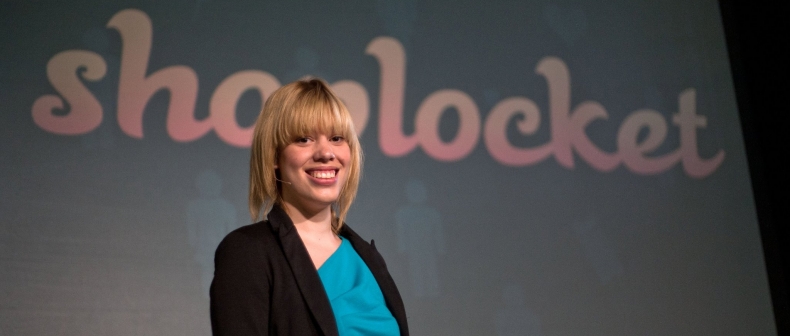
Katherine Hague at Extreme Startups’ demo day. Photo courtesy of Andrew Louis
Movers and Starters is an exclusive series that profiles the individuals who drive Toronto’s startup community.
At only 22, Katherine Hague is building one of Toronto’s most promising startups. And while that might seem like a young age to undertake the challenge of building a business, Hague has been working towards this moment for a long time. I sat down with her to chat about Shoplocket, the path she took towards building it, and some of the challenges she’s faced along the way.
Tell us a bit about yourself?
My name is Katherine. I’m the co-founder of ShopLocket. ShopLocket launched in May of 2012, and we help people sell online.
From what I understand, the idea behind ShopLocket came when you decided to make t-shirts for your then-consulting company, Ninja Parade (the company was named after this Onion video).
We had developed a website for the company that featured these cute ninjas. I wanted to put the ninjas on a t-shirt, so I asked my friends whether they would buy these t-shirts if I made them. Enough people said yes to warrant me finding a way to make them. I had about 30 of them made and they ended up sitting in my bedroom, because I didn’t know how I was going to sell them. I wanted to put them on my website, but I knew that in order to get my t-shirts onto an online store, I would have had to entirely redesign my website, which I didn’t want to pay someone else to do, and I would have had to pay $30 a month to maintain that functionality. So I started looking at other options, like a buy buttons or marketplaces, but they didn’t seem nearly as professional. So, in a sense, every option had a problem with it, which made me think: I want to sell a product from my website–why is it so complicated? And that’s really where the idea for ShopLocket came from.
Was it a difficult leap to drop what you were doing and start to attempt to make the idea behind Shoplocket a reality?
No, I had been planning startup events since I was sixteen, so I always knew I wanted to start something. When I was in high school, I had helped plan business competitions, and then I went on to plan a national conference for young entrepreneurs. The only reason I was doing consulting when I got out of school was because I wasn’t exactly sure what form my startup would take, but, in the meantime, I was alway trying to think of an idea for a business. Unfortunately, I would think of something, sit on it for two months, realize that it was the wrong idea to pursue and then I would try and think of something else. So the concept of starting something wasn’t particularly new or different, but what was different with the idea of ShopLocket was that it had this snowball effect. Once I started, more opportunities and resources would open up, and it was easy to attract others to it. I also had this feeling about ShopLocket that I didn’t have with my past ideas; it was something that people actually wanted.
So what was it like when you finally stumbled upon an idea that actually stuck?
I think there were definitely a lot of opportunities for the idea to die along the way, but even at those certain moments, the right resource would make itself available to us or things would just happen. Whether that was Heather Payne giving us our first investment, or getting into Extreme Startups or being able to raise a round of funding, there were always enough supporters and enough people that wanted to see us succeed that we were able to get ShopLocket to the next level. In the past, I think I had found myself in a lot of situations where I felt like I was spinning my wheels, waiting for something to happen and questioning whether what I was currently doing was something I wanted to dedicate the next five years of my life to. With ShopLocket, however, I’ve found myself having so much fun with it.
Speaking of Heather Payne: When I interviewed her, she mentioned a bit about the relationship you two share–is that something you can tell us a bit more about?
Heather and I met through Twitter in the summer of 2011, and, along with Ayla Newhouse who is a designer here in Toronto, the three of us started getting together every couple of weeks for dinner. At that time, I think we all thought we were entrepreneurs, but we had yet to actually start anything (laughs). But within three months of our first get together, both Heather and I did end up starting something; we actually quit our jobs on the exact same day without even knowing it. Alya followed shortly afterwards.
I think we gave each other the confidence to go out and try something. We didn’t know each other particularly well at that point, but as soon as we had all made the same commitment to create something, it made our relationship all that more valuable and important.
In the fall, After I had interviewed at Y Combinator and didn’t get in, I came to our get together in one of those, “What do I do now?” modes. I had quit my job two weeks before, and needed to figure out a way to get the company off the ground. It was at that point that I showed Heather and Ayla a demo of what we were working on. Within five minutes of seeing it, Heather said that she wanted to invest in the company. We had been drinking wine at the time, and I thought she was being crazy, so I said, “Okay, let’s talk about this in the morning.” The next day, Heather emailed me and said that she was still serious about investing in the company. The money that Heather invested in ShopLocket is what brought us all the way to launching our initial product in February.
I mean, what can I say? It’s this great relationship where we can go out and talk about all the things that are going on, and having someone that has been so supportive and has been there from the start is something that has been so valuable.
The Shoplocket team. Left to right: Katherine Hague, Dan Kalmar, Sumanth Ravipati, Marie-Eve Belanger, Paul Kalupnieks, and Andrew Louis. Photo courtesy of David Pike
From what I understand, you spend a lot of your time in San Francisco. Can you tell us about that arrangement?
Almost every e-mail I send is generally going to someone in San Francisco. Whether it’s a customer, a partner, or an investor, there’s just so much back and forth I do between here and San Francisco that sometimes not being able to be on the ground makes things a lot harder to accomplish. Making a decision and making sure that everyone is on the same page is so much easier and faster when its done in person as opposed to on the phone or through email.
Earlier this year, we had the opportunity to be a part of the CTA (the Canadian Technology Accelerator). The CTA is an accelerator run by the Canadian Consulate in San Francisco. They have this program where the consulate will pay for a desk space in the Valley you can use. The program went from January to the end of March, and while I was there I realized that I wasn’t sitting at my desk very often; instead, it was more so a place for me to have somewhere to sit for five minutes between meetings.
Anyway, spending a lot of time on a plane is sort of a necessary evil of starting a company in Toronto. Although its a great city to have your development team, there’s amazing talent in and around the city and it’s so culturally vibrant, it’s not necessarily a place where everyone in the industry is all the time.
Now that you’ve spent some time in both cities, how would you say they’re different in terms of their startup communities?
Toronto has a lot less of a mature ecosystem. I mean that in the sense that there’s not that many entrepreneurs who have had successful exits that you can go to when you need mentorship and advice. There are some for sure, and the ones that are there are all amazing people. But it’s not even remotely similar to walking down a street in San Francisco and, everywhere you look, there’s someone from a startup. If we were in a coffee shop in San Francisco, there would a meeting at almost every single table… which also means that you can’t say very much during those meetings, because there’s always flies on the wall (laughs).
After a couple of years of going to startup events in Toronto, you’re probably going to know everyone in the community, and that’s not to say that the community in San Francisco doesn’t get small fast, but everything there is on such a larger scale.
Your Twitter profile says that you’e a proud graduate of HackerYou. I take it that means you have some kind of development background?
Well, I will say that I’m not by any means the developer on ShopLocket–that’s entirely credited to Andrew and the rest of our development team. That said, about three of four years ago, I started going to this Rails pub night. I didn’t want to be stupid in conversation when I went there, so I started learning a bit of Rails and started coding really simple apps. It was through that process that I was able to gain some core understanding of what it is that developers do, and at the same time, gain the respect of some of my friends and the people that attended these meet ups. I think a lot of people underestimate how much understanding what your developers do can help. They believe that you don’t need to understand the development side to start a tech startup. But if you’re working with someone, I think it’s vital to have some kind of respect and understanding for what they do.
As a side benefit of attending so many tech events, I had developed an extensive network, so by the time I started ShopLocket, there was no shortage of people that I could call upon for favours. I think one thing that a lot of people do is that they wait until they have an idea for their business before they build the network required to realize that idea. That’s the worst possible time to build a network; it takes time to develop relationships. This is why I recommend to people that if they have any inclination towards building something in the future that they just go out and meet new people now.
ShopLocket recently announced a partnership with WordPress. Can you tell us how that agreement came about and what it means for ShopLocket?
Before our partnership, anyone using WordPress.com had no way to sell something on their site. By the time we came to an agreement with WordPress, we had been talking to them for about eight months. Enabling e-commerce on WordPress.com was something that was high on their to-do list. Going forward, WordPress VIP and Enterprise users will be able to use our plugin to sell something straight from their website.
If you talked to me a year-and-a-half ago, I would have told you one of my biggest goals was to get ShopLocket to work on WordPress, and to have this partnership now is a huge thing for us. Before this, 62 million websites had no way of selling something. Now, ShopLocket is one of the first e-commerce platforms to make it onto WordPress. We’re a really small company, but to get a partnership of that caliber is something that will help us establish our brand down the road.
Okay, so now that you’ve secured this partnership, where do you hope to take the platform in the next little while?
We actually started rebuilding our product from scratch last November. We used the announcement of our partnership with WordPress as an opportunity to relaunch our product. Now, our focus is on supporting and iterating a fully mature version of Shoplocket. And when I say mature, I mean that anyone can now use the new version of the platform and it will look just as professional as anything else on the market.
Before the relaunch, I couldn’t have said that. The first version of the platform was our way of testing emendable commerce and finding the answer to the question of whether people wanted this type of functionality on their website. Now, we’re doing embeddable e-commerce in such a way that I think anyone would be proud to have the ShopLocket plugin on their site, WordPress blog, Facebook or Tumblr. Going forward, we’re focused on rolling out a product that will help anyone: from the people that are selling just a few things to people with hundreds and thousands of dollars in daily sales.
Hague and Shoplocket co-founder Andrew Louis. Photo courtesy of Dan Kalmar
You mentioned your co-founder, Andrew Louis, before. Can you tell us a bit how you two meet and how he has help with running the company?
Andrew and I met about four of five years ago. I was planning one of my entrepreneurial conferences and he was helping plan CUSEC, which is a conference for young software engineers. We both ended up going to the Rails pub night I had mentioned earlier, and so we got to know each other. At the time, Andrew was doing WordPress development on various contracts, so he understood the pain of having a costumer ask him to enable commerce on their WordPress website. Before the idea for ShopLocket came to us, we had been brainstorming a lot of different startup ideas and just things we wanted to work together on. When the idea did come, in the first week it started out as relatively low commitment on both our parts, but then quickly sprawled into something that’s taken over our lives. Andrew has been amazing. While I’m scatterbrained and away from the office, he’s been there with the team on a daily basis running the show. I can’t imagine not having him as a co-founder.
What has been one challenges of building the company?
One thing I need to get better at is stopping to appreciate how far we’ve come. I’m prone to thinking about the next thing that needs to get accomplished even before I finish what I’m currently working on. The only way I think you can survive as an entrepreneur is to celebrate those little moments, because there’s so many moments that you’re either tired, flustered, or someone is telling you that your idea t’s not going to work. One of the ways we try to celebrate is through a timeline we’ve posted on the site that lists all our accomplishments and milestones.
I know its likely that free time is something of a distant memory for you, but what are some things that motivate and inspire you outside of your work?
I think a lot of what built me into who I am now is the fact that I did competitive gymnastics through middle school and high school. That was six days a week and included competing and traveling, and I feel absolutely in love with the discipline associated with that. I realized I don’t do very much outside of work because I have a new obsession, and my new obsession is this company. But the ability to focus on something and get better at and really make something out of it is something I find really interesting. When I was younger, it was that ability to focus on gymnastics, and now that I’ve older, I love the idea that this company is something I’m so focused on. This is something I’ll probably always do, and whatever my next phase is, I’m sure I’ll be just as obsessed with it (laughs).
Going forward, what’s next you for personally and professionally?
My life right now is this company. It’s making it everything we’ve imagined it to be. At the same time, I say that many of the best experiences I’ve had in my life have been driven by this company. I’ve gotten to live in San Francisco, I’ve gotten to travel a tonne, I’ve been invited to dinners and conferences, and I’ve met interesting people. This company is an incredible tool for self-growth, and what I’ve learnt in this year-and-a-half is going to be so incredibly valuable in absolutely everything I do after this. So I’m excited to see what else I’m going to learn and get to experience, and it’s all thanks to ShopLocket being a great vehicle for that.
____
Igor Bonifacic is a writer working for the Toronto Standard. You can follow him on twitter @igorbonifacic.
For more, follow us on Twitter @TorontoStandard and subscribe to our newsletter.














